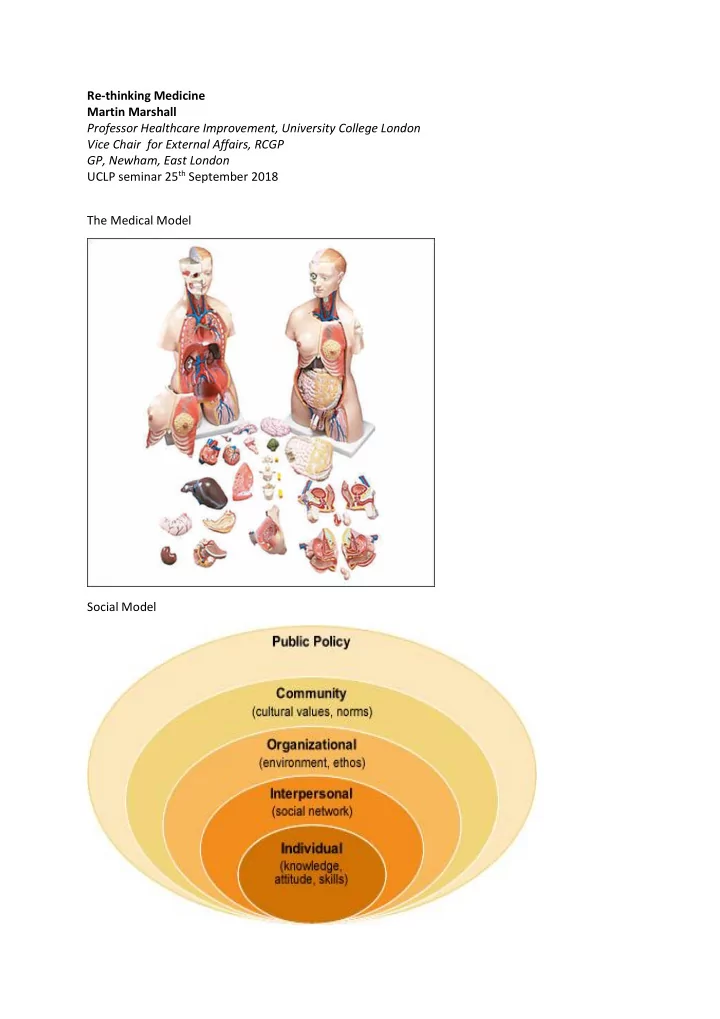

Re-thinking Medicine Martin Marshall Professor Healthcare Improvement, University College London Vice Chair for External Affairs, RCGP GP, Newham, East London UCLP seminar 25 th September 2018 The Medical Model Social Model
QUOTES ‘The medical establishment has become a major threat to health’ Ivan Illich, 1974 The need for a new medical model: A challenge for biomedicine’. Science 1977 ‘All medicine is in crisis, namely adherence to a medical model of disease no longer adequate for the scienti fic tasks and social responsibilities of medicine’ Patients, policy makers and doctors are re-thinking medicine Manifestations of ‘Re - Thinking Medicine’ : 1. Over-diagnosis and over-treatment Evidence to support focus on over-diagnosis and over-treatment: -Early detection of thyroid cancer has had no impact on mortality - 80% of people on cholesterol lowering drugs probably don’t benefit from them -60% of men with a positive PSA test do not have cancer which will impact on morbidity or mortality 2. Social determinants of health Evidence to support focus on social determinants of health: UK ban on smoking in public places 3. Social prescribing Evidence to support: -Few rigorous studies - only 1 RCT identified in recent review -28% (2-70%) reduction in demand for GP services -24% reduction in ER attendances -Return on Investment unclear 4. Person-centred care Evidence to support: -A systematic review of 39 studies concluded that 43% found a statistically significant positive relationship between Shared Decision Making and patient outcomes Of these improved outcomes: -54% were cognitive/affective -37% were behavioural -25% were health outcomes 5. Healthy communities and health creation Evidence to support: -Difficult to evaluate complex multi-faceted interventions -Emphasis on case studies -Improving organ donation in South Wales
-Cooking courses for people with type 2 diabetes -Early evaluation of Bromley by Bow Centre – development of theory of change 6. Health systems and systems improvement Evidence to support: -Identifying and managing people at risk of exacerbation of long term condition deterioration- ASSIST-CKD, 2018 -Medicines optimisation and managing poly-pharmacy- PINCER, 2016 -Improving safety for residents in care homes 7. Changing the way people thing about health and illness Evidence to support: I nitiative start by GP Hugh Van’t Hoff and teacher in Glos, Facts4Life: -Controlled before and after study showed small but significant reduction in number of children who think they always need to see a doctor or take medication if feeling unwell - ‘I’ve told my mum she has to buy sugar - free soft drinks for me’ What do we need to do? 1. Develop a common narrative Re-thinking Medicine: a new dialogue: -Re-defining the role of the doctor -Recognising the limitations of the traditional medical model as well as its benefits -Enabling the assets for health and well-being which lie outside health services -Encouraging a more central role for people in making decisions about their health and care 2. Decide what needs to be done to spread and sustain idea -Established Cochrane Collaboration to summarise what is known -Set standards for good practice -Build infrastructure to update guidelines -Developed teaching resources -Build knowledge base for implementation 3. Focus on professional education -Medical Schools -Specialty training -Continuing Professional Development 4. Clarify what progress would look like -Greater engagement of doctors in re-thinking medicine activities e.g. shared decision making, avoiding risks of over-diagnosis, considering social determinants of health -Leadership from professional bodies e.g. CPD programmes, incorporation into professional training -Policy reforms e.g. changes in payment mechanisms
Recommend
More recommend